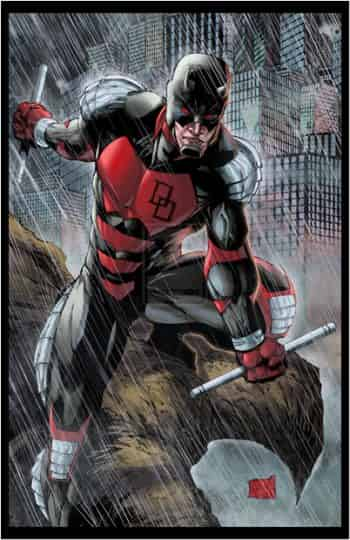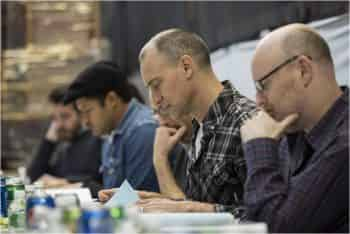Bonus
-
Writing and Political Opinion (Part I)
The release of the last Batman (The Dark Knight Rises) triggered a fierce media debate about Christopher Nolan’s political intentions. Was his Batman defending against the values of conservatism? The hysteria reached its peak when the villain’s name, Bane, was associated with the name of a company founded by Mitt Romney (Baine Capital). Chuck Dixon, the co-creator of Bane, had to make a public statement to declare his conservative beliefs (Jozef Siroka, « Batman ne porterait pas le carré rouge », www.lapresse.ca, July 24, 2012).
This is reminiscent of when Frank Miller harshly denounced the Occupy movement, a position that was then criticized (Brent Chittenden, “Oh Frank Miller… Creators and Politics,” November 17, 2011, www.comicbookdaily.com “Watchmen Writer Alan Moore Set to Occupy Comics After Spat With Frank Miller”, www.geeksofdoom, December 6th, 2011). However, as Sara Lima pointed out, V for Vendetta remains an excellent comic even if Alan Moore claims anarchy as the best form of government (“Do Politics in Comics Alienate Readers?” www.comicvine.com, October 6, 2011).
We feel that a work of art should never be crushed under the weight of political or social metaphor. Otherwise, the characters become unmoored from reality and their sole purpose is to be spokesmen for the author. Authors who want to deliver a strong social or political message should consider essay writing.
-
Should Characters Be Approached Differently Depending on their Gender?
Sara Lima asked an excellent question: “How to Wrtite A Strong Female Character? (“Greg Rucka on How to Wrtite A Strong Female Character,” www.comicvine.com, December 8, 2011). During the early stages of our project, it was clear that this was a very male universe. And more recently, we saw that some stories only had men in them. For a long time, we were hesitant to develop female characters because we felt we didn’t have the necessary baggage to develop a multifaceted female psychology. But we were looking at it the wrong way: It wasn’t developing female characters that we needed to focus on but rather creating strong characters. We mean strong here in the sense of complex, with areas of light and shadow, and with overt and hidden motivations. Once we realized this, there was no longer any barrier to the creative process.
-
Keeping from Spiraling Out of Control
In a harsh critique published a few months ago, Graeme McMillan accused some of the US’s great contemporary comic-book writers of causing the stagnation of the industry: “For an industry that feeds on its own past to go 20 years without fresh characters or concepts is death. The most telling sections in ‘Leaping Tall Buildings’ are thus those written about industry powers like Brian Michael Bendis, Joe Quesada, Grant Morrison and Dan DiDio. These are the men most responsible for the failure of the big publishers to take advantage of the public’s obvious fascination with men in capes (“The Four Men Who Have Destroyed the Superhero Comic Industry,” www.newsarama.com, May 30, 2012).
Is this a problem with the authors or with publishers that want to create events? Chris Sims points out two major problems in his analysis of comic-book evolution since the 1990s. First, there is the increased power of collections, which puts pressure on the first issue of any series, regardless of its future development or artistic qualities. Then, publicity events have turned out to be counterproductive. Sims cites the example of the “death” of Superman: “DC’s bright idea of ‘killing’ Superman, which produced one of the best-selling comics of the modern era. In retrospect, it’s pretty clear to me that this was probably a terrible idea—and not just because it was a story where Superman and a giant bone monster in green bike shorts punched each other to death. It’s great that they sold a million comics and bought Dan Jurgens a solid gold statue of Booster Gold or whatever, but they also had a truly massive amount of media coverage that told people that Superman was dead, and lured them into a shop where they bought a comic that — if they bothered to actually pop open the polybag and read it—ended with Lois Lane cradling Superman’s lifeless body. In real life—in most fiction—that tends to be the end of things. They told the biggest potential audience they had ever had that Superman was dead. Dead. Which, to rational people who are not familiar with how comic books work, means “there will be no more Superman stories so it is completely unnecessary for you to ever return to this shop and buy another one of these” (“What’s Up With the 90s,” www.comicsalliance.com, July 27, 2012).
-
Event Creation
As we have said in the past, changing authors is often used as a way to boost sales for a series. But a new author isn’t always enough and so an event must be created. Chichester admitted as much in an interview where he explained that the change in Daredevil’s costume in the early 1990s was a way to attract readers’ attention to the series and to position other changes in tone that they wanted to introduce (“Interview With D.G. Chichester (February 1998),” www.manwithoutfear.com).
However, these media events are now often clichéd. Readers know very well that the death of a major character is only a momentary eclipse to prepare their return. Like Graeme McMillan said: “It doesn’t help that it’s War in these teasers, a word that has similar weight at Marvel as “Crisis” does for DC. Between Secret War, Ultimate War, Civil War, Silent War, Chaos War and countless other wars that I’ve probably forgotten about (Oh! War of Kings, of course), the word has become almost meaningless in its attempt to suggest epic bombast, just like… Well, like the sight of Cap’s shield either cracked or splattered with blood, really. There’s an amazing sense of déjà vu from these trailers that’s unfortunate, especially considering that Avengers Vs. X-Men was already treading in ‘Haven’t I seen superheroes punching each other a lot recently in Civil War and X-Men: Schism?’ waters” (“I Don’t Wanna Live a War That’s Got Not End in Our Time,” www.newsarama.com, June 26, 2012).
-
Script Editors
Ensuring narrative consistency is a great challenge, particularly when there is a change of writers. In our opinion, it should be the publisher’s role to ensure a harmonious transition. But that is generally not what happens, and most often, getting a new author is seen as an opportunity to re-launch a title. This may lead publishers to agree to a change in direction that isn’t always elegant. Andrew Aardizzi was very critical about the work of Mark Waid on Daredevil. He claimed that the author was breaking away from recent events and going so far as to deny them (“Episode 12: I Object! (to Mark Waid’s ‘Daredevil’),” www.comicbookdaily.com, January 19, 2012).
TV offers a simple solution for this problem. It’s rare for a TV series to be written entirely by the same team of writers. A script editor has the job of making sure that the developments one writer creates will fit into the series’ overall storyline.
We are currently in the same situation. Due to lack of time, we have turned over the dialogue for some storylines to another writer. But we always check the work and do any tweaking necessary to ensure the consistency of our story.
Also, writing in a team is very stimulating. It creates opportunities for discussion that allow us to think more deeply about the characters.





